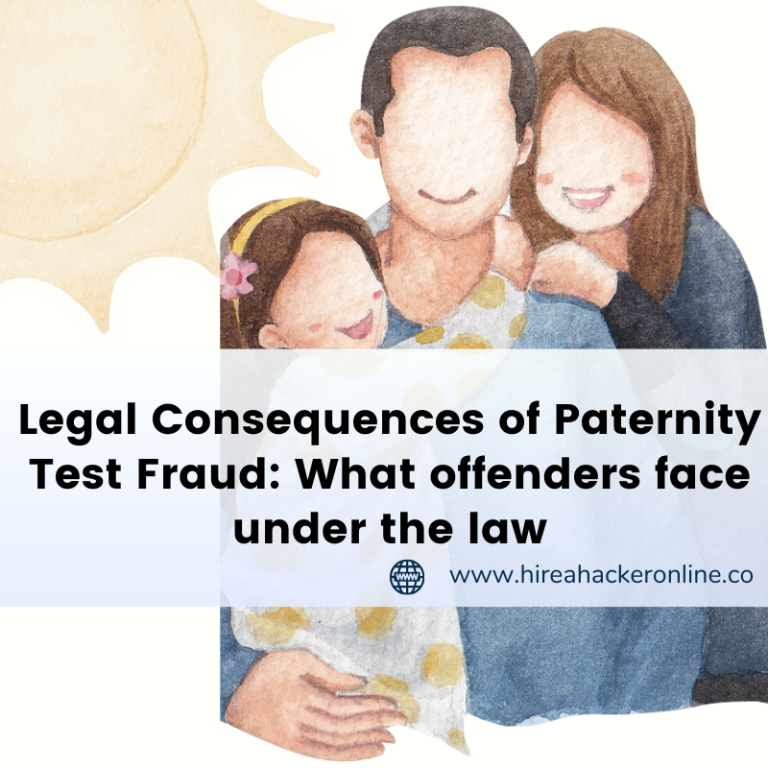Paternity tests help find out who the child’s real father is. Child support, custody, and property can all be changed by these tests. There are, unfortunately, people who lie about DNA tests. This piece talks about the legal effects of cheating on a paternity test. It talks about the punishments criminals face and how they affect families.
Understanding Paternity Test Fraud
When someone changes or fakes paternity test results, this is called paternity test scam. Several things can be done to commit this scam. One way is for someone to switch samples. They might also show fake papers or force other people to give them false information. Claims that aren’t true can have serious legal implications.
Legal Framework Surrounding Paternity Testing
Each state has its own rules about DNA tests. There are clear rules in most states about how to give these tests. They also explain what the law says about scams. The courts are interested in these cases. When someone lies about paternity, they are breaking rules about child support and family.
Criminal Charges for Paternity Test Fraud
People who cheat on a paternity test can be charged with a crime. People who break the law may face misdemeanours or charges, depending on the state. People who are charged with misdemeanours may get fines or short jail terms. Felony charges, on the other hand, can lead to longer jail terms and bigger fines.
Penalties for Misdemeanor Offenses
Fraud on a pregnancy test is often considered a misdemeanour. People who break the law could get fines of up to $1,000. They could also spend up to a year in jail. Also, these fines can get worse if the fraud has a big effect on the people who were affected.
Penalties for Felony Offenses
In some places, lying on a paternity test is a felony. Felony charges can lead to harsh punishments. Offenders could get fines of more than $10,000. Besides that, they might spend a few years in jail. Which penalties are used depends on the laws in the state and the details of the case.
Civil Liabilities
In addition to criminal charges, offenders may also face civil liabilities. The affected parties can sue for damages. Victims may seek compensation for emotional distress, financial losses, and other damages. This compensation can include:
- Medical expenses
- Legal fees
- Lost wages
Emotional Distress Claims
Fraudulent paternity tests can make people feel very bad about themselves. People who have been victims may feel anxious, depressed, or betrayed. When courts give penalties, they often look at these things. People who break the law can be held responsible for the mental harm they cause.
Financial Repercussions
In many cases, paternity test fraud can have severe financial implications. For example, if a mother falsely identifies a father, he may face wrongful child support payments. Courts may require the offender to repay these amounts. This repayment can lead to financial strain on the offender.
Impact on Family Dynamics
Paternity test fraud can have long-lasting effects on family relationships. When the truth comes to light, it can damage trust and lead to conflict. Families may experience emotional turmoil, resulting in broken relationships. Children caught in the middle may suffer the most. They can experience confusion and emotional pain.
Child Custody Issues
Fraudulent paternity claims can complicate custody arrangements. When paternity is misrepresented, it can impact custody decisions. Courts prioritize the child’s best interests. If fraud is discovered, the court may reconsider custody arrangements. This reassessment can lead to significant changes in the child’s living situation.
Legal Defenses Against Paternity Test Fraud
Those accused of paternity test fraud have legal rights. They can present various defenses against the charges. One common defense is lack of intent. The accused might argue they did not intend to commit fraud. This defense can be effective in some cases.
Proving Lack of Intent
To prove lack of intent, the accused must provide evidence. They may show that they acted under duress or were misled by others. If successful, this defense can lead to reduced charges or a dismissal of the case.
Other Potential Defenses
Other defenses may include:
- Mistake of fact: The accused genuinely believed their actions were legal.
- Informed consent: All parties involved consented to the actions taken.
These defenses can vary in effectiveness based on the case’s details and state laws.
Conclusion
Paternity test fraud is a serious offence with significant legal consequences. Offenders face criminal charges, civil liabilities, and damage to family relationships. The penalties can range from fines to prison time. Victims may seek compensation for emotional and financial damages. Understanding the laws surrounding paternity testing to avoid the pitfalls of fraud is crucial. Both parents and children deserve fairness and honesty in these sensitive matters. Legal consequences emphasize the importance of truth in paternity claims.
Sources:




